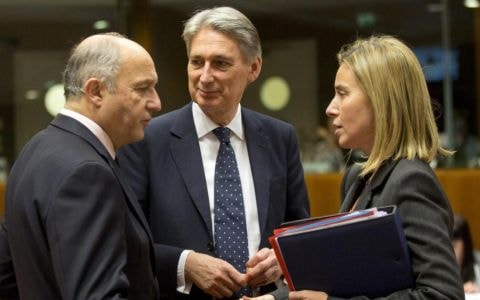EU divided on cooperation with Muslim world against terrorism
Despite affirming their desire to cooperate with the Muslim world to fight terrorism, the foreign ministers of the 28 EU countries have yet to agree on how to do this.
However, international analysts all agree that this is a risky choice for Europeans when relations between the West and the Islamic world are not very peaceful.
The fight against international terrorism has never been easy, if not increasingly complex and difficult, especially when terrorist violence that has gone beyond Europe's control has reached the borders of these countries.
 |
| French Foreign Minister Fabious (left) and his British counterpart Hammond (center) discussed with EU High Commissioner Mogherini how to cooperate with the Muslim world against terrorism (Photo: Reuters) |
Ten days after the bloody attacks in Paris, the French Foreign Minister and the remaining 27 member states of the European Union on January 19 resumed discussions to find the most effective way to fight terrorism.
And the answer that Europeans have come up with is cooperation with the Muslim world, an option that the bloc believes can defeat terrorism at its roots.
Unlike last week's EU Interior Ministers' meeting, this Foreign Ministers' meeting did not propose specific measures to combat the threat of terrorism or to reassure public opinion.
The highlight of this meeting was the European Union's decision to bring together governments that are often seen as unstable and can be seen as having different stances in the fight against terrorism such as Türkiye, Egypt, Yemen, Algeria and the Gulf states.
According to the High Representative of the European Union for Foreign Affairs and Security Policy, Federica Mogherini, terrorist attacks are particularly targeting Muslim communities around the world, so the international community needs to unite on a front to fight this common threat.
“What we need is a coalition, a dialogue, working together in cooperation because we are facing the same threat and I think this is what we need to promote. Not only cooperation between the European Union and Arab countries, but also cooperation between the European Union and Muslim communities and with all minority communities in the European Union, as well as cooperation between countries in the region,” Ms. Mogherini said.
However, the question now is which alliance and by what means is most suitable when there is such a great difference and one can say conflict in positions and ideologies between Europe and the Islamic world.
This is clearly demonstrated by recent events in France: following the outrage over the terrorist attack on the editorial office of the satirical magazine Charlie Hebdo, Muslim communities around the world from Niger, to Palestine and Iran took to the streets to protest against France, mainly because the government of this country allowed the magazine Charlie Hebdo to continue publishing satirical pictures of the Muslim prophet Mohammed.
Not only until this event, but for a long time, a “Western Rejection Front” has existed in the Middle East and since the beginning of 2011, events happening in Arab countries seem to have added fuel to the tensions between the West and the Muslim world.
However, the first meeting of EU foreign ministers since the attack on the Charlie Hebdo magazine office failed to provide a convincing answer, apart from a high level of consensus on two issues: the appointment of a counter-terrorism expert at 12 EU embassies in "sensitive" countries and a counter-attack plan in Arabic on the Internet to counter extremist propaganda.
French Foreign Minister Laurent Fabius left Brussels without making any statement. German Foreign Minister Frank-Walter Steinmeier avoided the issue, while British Foreign Secretary Philip Hammond pledged to do whatever was necessary to ensure a safe Europe.
“We are committed to doing all that is necessary to ensure a Europe that is safe from the terrorist threat. We will continue to discuss the challenges posed by radical Islamism and find answers to these challenges,” Mr Hammond said.
Concrete answers to the terrorist threat and countermeasures will have to wait until the meeting of EU Interior Ministers on January 29 and then the EU Summit on February 12.
All options are on the table, such as systematic exchange of information between police and intelligence forces, effective control of the Schengen border areas, intensified fight against the trafficking of weapons of war, dismantling militant recruitment networks, money laundering or censorship of Internet content.
These are all measures to promote cooperation between EU member countries and perhaps this is what Europeans need most at the moment because "warm inside, peaceful outside"./.
According to VOV.VN
